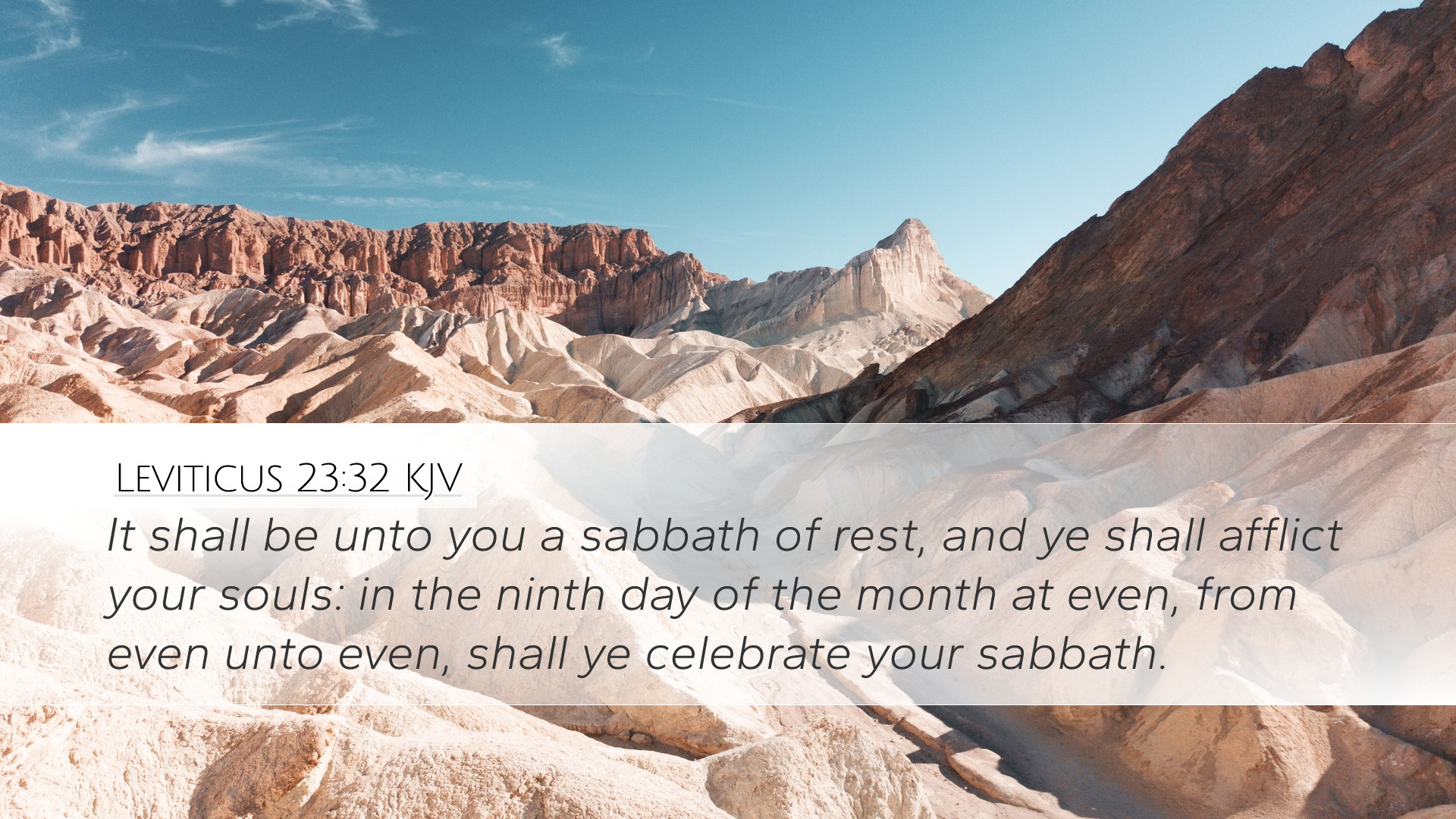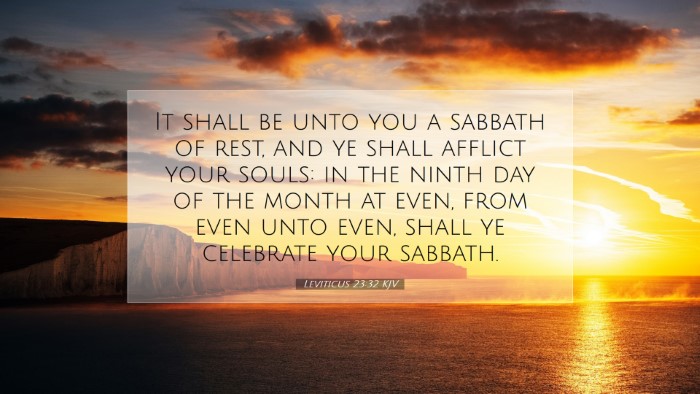Commentary on Leviticus 23:32
Verse Context: Leviticus 23:32 states: “It shall be to you a sabbath of solemn rest, and you shall afflict your souls; on the ninth day of the month at evening, from evening to evening, you shall celebrate your sabbath.” This verse is part of a larger discourse on the festivals and holy days as prescribed in the Mosaic Law. It specifically relates to Yom Kippur, or the Day of Atonement, which is the most sacred day in the Jewish calendar.
Insights from Commentary Tradition
Matthew Henry's Commentary
Matthew Henry emphasizes the significance of afflicting one's soul, which pertains to both physical and spiritual introspection. The Day of Atonement serves not only as a day of fasting but also as a time of deep soul-searching and repentance. Henry notes that the command to "afflict your souls" reminds the people of their sins and God's holiness.
- Spiritual Reflection: Henry interprets this affliction as an invitation for self-examination, urging believers to consider their own hearts in light of God's law.
- Communal and Individual Responsibility: He suggests that this day is not only about individual repentance but also about the community coming together to reflect on their covenant relationship with God.
Albert Barnes' Notes on the Bible
Albert Barnes elucidates the timing and nature of the observance, highlighting its significance as a “sabbath of solemn rest.” He notes that this Day of Atonement stands out in its solemnity, requiring a cessation from work and an attitude of reverence before God.
- From Evening to Evening: Barnes comments on the transitional nature of the day, which begins at sunset. This reflects the Jewish understanding of time, where a new day commences at dusk.
- The Importance of Affliction: He reiterates the idea that affliction signifies humility in the presence of God, underscoring the relationship between God’s holiness and human sinfulness. This is a key theme in Old Testament law, preparing the way for future understanding of grace.
Adam Clarke's Commentary
Adam Clarke adds a nuanced consideration of the ritualistic aspects of Yom Kippur, examining how the observance serves to foreshadow the ultimate atonement through Christ. Clarke highlights that the practices surrounding this day have long-lasting implications for Christian theology.
- Foreshadowing Christ: Clarke draws connections between the sacrificial system of the Old Testament and the redemptive work of Jesus, noting that the atonement rituals point to the ultimate sacrifice of the Lamb of God.
- The Role of the High Priest: He also emphasizes the role of the High Priest in the atonement process, connecting it to Christ’s intercessory work. This perspective enriches the understanding of Jesus as the fulfilment of the law.
Theological Implications
This verse, therefore, carries profound theological significance. It not only articulates the necessity for repentance and acknowledgment of sin within the community but also highlights the merciful nature of God who provides a means for atonement. The insights from these commentaries suggest several key themes:
- The Holiness of God: The command to afflict one’s soul emphasizes a reverential response to God’s holiness and justice.
- Corporate Worship: The aspect of communal observance underlines the importance of togetherness in faith and the shared responsibility for sin.
- Preparation for the Gospel: This observance foreshadows the New Testament revelation of atonement through Christ, thus bridging the old and new covenants.
- Reflection and Repentance: The call for personal reflection remains relevant in the church today, urging believers to seek repentance regularly.
Practical Applications for Today
For modern-day believers, Leviticus 23:32 serves as a reminder of the need for regular periods of reflection and repentance. As pastors, students, theologians, and scholars contemplate the implications, they are encouraged to communicate several key lessons:
- Value of Stillness: Incorporating moments of stillness and reflection in personal and corporate worship can lead to deeper spiritual engagement.
- Acknowledging Sin: Regularly confronting the personal and communal nature of sin allows for authentic worship and a healthier church community.
- Understanding Atonement: Emphasizing the connection between the Old Testament practices and the New Testament fulfillment in Christ can deepen theological education and appreciation.
- Encouragement for Repentance: Leaders should encourage a culture within the church that supports honesty about failure while magnifying the grace of God.
Conclusion
In conclusion, Leviticus 23:32 is a rich source of spiritual nourishment and theological depth. The insights extracted from the traditions of Matthew Henry, Albert Barnes, and Adam Clarke highlight the ongoing relevance of this ancient command. The essence of reflection, repentance, and atonement creates a framework for understanding both the Old and New Testament narratives, culminating in the person of Christ. Engaging with these scriptural truths enables pastors, students, theologians, and Bible scholars to grow in their faith and effectively lead others in the pursuit of holiness and a deeper relationship with God.


